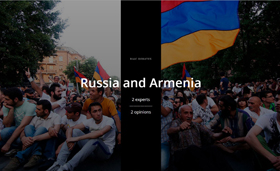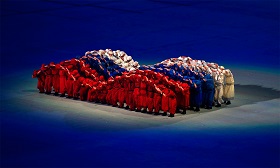Soft Power: Reality and Myth
Jacobi, 1872
(no votes) |
(0 votes) |
By the beginning of 2016, Russian experts came around to the opinion that Russia had not been applying enough effort to capitalize on information technology (including through public diplomacy) in order to promote its image abroad. Two solutions have been offered to the question of “what to do?” The first involves increased financing for relevant programs and funds. The second suggests learning to work not only with governments, but with civil society as well. I would venture to suggest a third possible solution.
By the beginning of 2016, Russian experts came around to the opinion that Russia had not been applying enough effort to capitalize on information technology (including through public diplomacy) in order to promote its image abroad. Two solutions have been offered to the question of “what to do?” The first involves increased financing for relevant programs and funds. The second suggests learning to work not only with governments, but with civil society as well.
I would venture to suggest a third possible solution. The relatively poor performance of Russia in terms of soft power has not been due to insufficient funding, an incorrect strategy, or the incompetence of PR experts. The main reason appears to be the oversized assessment of the role of soft power in international relations. Meanwhile, the experience of the last decade has shown that soft power works if and only the other party is willing to accept it. If there is no such willingness, the most sophisticated mechanisms information technology will be ineffective. Given this important, though unpleasant, observation, it makes sense to revise Russia’s policy in the area of soft power.
Leo Tolstoy versus Joseph Nye
Joseph Nye [1], denotes achieving strategic goals through non-coercive, cultural and ideological mechanisms. According to Joseph Nye and his followers, an attractive image of the country can enlist sympathies in public opinion in other countries.
However, the positive image of a country does not mean that the elites of other countries will avoid conflict with it. Leo Tolstoy described exactly this situation in his novel “War and Peace.” In the beginning of the 19th century, the Russian nobility spoke French better than Russian, received education in France and held real estate abroad. Many representatives of the Russian upper class admired Napoleon Bonaparte. However, the cult of France did not prevent Russia from waging a series of ruthless wars against Napoleonic France. Russian generals projected military operations against France in French. It is hard to imagine a more striking example of the limits of soft power.
The history of colonial empires confirms the correctness of Tolstoy’s observations. Elites from British colonies received their education in the educational institutions of Great Britain. However, during the collapse of the British Empire in the 1940s, nearly no one wanted the colonial status to survive. Moreover, it was not traditionally problem-plagued India that led this process, but dominions with the Anglo-Saxon elite, namely Australia and New Zealand.
Russian generals projected military operations against France in French. It is hard to imagine a more striking example of the limits of soft power.

Soft power can do nothing in a country that forges its identity on the hatred for another country or its people.
What is more, the use of soft power technology in various countries has produced different effects. France under Charles de Gaulle (1958-1969) made its policy retaining control over the former colonies by educating their elites. To achieve this goal, the International Organization of La Francophonie was set up in 1970 to preserve and spread the French language and French culture. The position of the latter has been kept in the countries of North and West Africa: the elite of those countries willingly maintain political and cultural links with their former mother country. At the same time, the French language and French culture have completely lost their influence in Indochina (Vietnam, Laos and Cambodia). Only a small group of the older generation that was educated during the French Empire still speaks French.
Many experts share the opinion that Russia has abandoned the Soviet policy of shaping the minds of the elite in Eastern Europe. But before World War II, the countries of Eastern Europe – from Finland to Yugoslavia – had a particular dislike of the Soviet Union and formed an anti-Soviet “sanitary cordon.” The burst of Russophobia in the late 1980s testified to the fact that the Soviet Union had failed to alter the anti-Soviet feelings that were prevalent in those countries.
Любопытна сама постановка вопроса Дж. Наем: рассказ о культуре страны и эффективности ее политических институтов вызовет к ней волну симпатии. Однако реакция может быть принципиально иной — от зависти до прилива ненависти, как это не раз было в истории.
Limits of soft power
Small and medium-sized countries will always be wary of a large and powerful country.
The use of soft power has natural limits. To put it tentatively, we can single out three such limitations that nullify the effect of soft power.
The first one is geopolitical. Small and medium-sized countries will always be wary of a large and powerful country. At best, their elites will always look for something to counterbalance the cultural and ideological influence exerted by other great powers and, at worst, will reject the powerful neighbor’s cultural policy, perceiving it as a new form of imperialism. It is hardly a coincidence that the strongest Russophobia is peculiar to the countries of Eastern Europe, while the strongest anti-American sentiments are witnessed in Latin America.
The second limitation is historical. The feud between some nations has such deep roots that putting an end to it through soft power instruments is hardly possible [2]. Soft power can do nothing in a country that forges its identity on the hatred for another country or its people. How much should the Soviet Union have invested in Germany in 1934 to make the latter pro-Soviet? It is obvious that nothing could have changed an already established mind-set.
The third limitation is cultural. Different nations and societies assess their role in history in different ways. Russian political scientist T. Alexeyeva rightly notes that Russian society has never had a sense of grandeur about itself. Russia has always considered itself to be a “catch-up country,” seeking the approval of those who “lead the way.” [3] Going into opposition towards other nations has often taken painful and aggressive shape in Germany and Japan. Russia has never had its own Georg Wilhelm Friedrich Hegel, who claimed that the Absolute Idea could self-actualize only in the German world, and that the history had reached its end. Russia has never had its own Paul Rohrbach, who believed that Germany was surrounded by “unhistorical peoples.” [4] Accordingly, the ability to adopt soft power appears to be quite peculiar to each country.
These limitations result in a circumscription of the successful application of soft power. Soft power is a tool for enlisting the sympathies of undecided people, rather than of making enemies change their mind.
From Joseph Nye to Lev Gumilyev?
This understanding of soft power was offered not by J. Nye, but by Soviet historian and ethnologist L. Gumilyov. He coined the term “complementarity” as “the principle of individuals’ subconscious liking each other that draws the line between friends and foes.” [5]
Accordingly, there are four types of complementarities:
- Positive as a subconscious feeling of mutual sympathy;
- Negative as a subconscious feeling of mutual antipathy;
- Zero as a feeling of indifference to each other;
- Asymmetrical, when only one of the interaction participants is positive-minded in relation to the other.
The ability to adopt soft power appears to be quite peculiar to each country.
Here are a few interesting examples. Since the end of the 18th century, the Russian elite had a strong prejudice in favor of what was French: the desire for Russian-French bilingualism and for an assimilation of French culture. (The attempt of Peter I to make Dutch culture the behavioral criterion ended in failure: the Russian nobility did not come to like either the Netherlands or Dutch.) However, Russophilia has never been widespread in France. The French elite have never aspired to be Russian-French bilinguals, or to gain profound knowledge of Russian culture.
Russian-British relations offer another interesting example. Russia is known for its traditional complaints about Perfidious Albion, while Britain – for its fears of a “barbaric Russian expansion.” As such, Russia and Britain were allies in almost all major wars of the last three centuries (with the exception of the Crimean War). Geopolitical interests – the desire to prevent the establishment of another country’s hegemony in continental Europe – overpowered cultural antipathy.
What to do?
The theory of complementarity allows us to understand why Russia’s policy in the area of soft power is not effective. The focus of Russia’s attention has been placed on countries that have been fundamentally prejudiced against our country. In addition, the Russian World concept works poorly in foreign countries. In contrast to Chinese or Jewish migrants, Russian emigrants, as a rule, do not seek to maintain ties with their historical homeland, and want to quickly integrate into the new society and forget that they are Russian.
Soft power is a tool for enlisting the sympathies of undecided people, rather than of making enemies change their mind.
Russia should restructure its soft power policy in four directions.
First, it should be recognized that there are countries, in which Russia's application of soft power will never bear fruit. They include most Anglo-Saxon countries and the countries of Eastern Europe. The attitude towards Russia there is a priori critical, if not openly hostile. Therefore, only a minimum amount of resources should be committed for work with this group of countries.
Second, more attention should be paid to the countries of the far abroad, where attitudes towards Russian are genuinely favorable. Efforts to enlist sympathies of the public opinion in the countries of continental Western Europe (primarily Germany and Italy) and East Asia, including Japan, are sure to bear more fruit. Russian culture is appreciated and welcome there. Israel and Greece with their strong cultural and historical ties with Russia are in the league of their own. However, Moscow's attention to them leaves much to be desired. For example, the well-known Russia Today television network has no German or Italian departments yet, although Russian broadcasting in these languages would have been appreciated in these countries immensely, given the deliberately downgraded status of their languages in the world today.
Third, Russia should expand cooperation with countries with a neutral complementarity. For states in the Middle East, Southeast Asia and Latin America, Russian culture has always been something distant and exotic. But along with this, our interaction is not burdened with a bitter legacy of the past.
The focus of Russia’s attention has been placed on countries that have been fundamentally prejudiced against our country.
Fourth, Russia has no comprehensive strategy for the use of soft power in the CIS countries. Meanwhile, in the post-Soviet space, Russia literally finds itself between a rock and a hard place: it has to preserve the educational space in Russian without arousing suspicions of neo-imperialism.
Another myth that the theory of complementarity dispels deals with the theory of multi-vector nature. “The Enemy of My Enemy Is My Friend” has not lost edge in politics. However, the reverse principle “The Friend of My Enemy Is My Enemy” is just as true. Russia, like any country, cannot be similarly good for all the feuding parties. In some cases, it will have to make a tough choice.
1. Nye J. Bound to Lead: The Changing Nature of American Power. N.Y.: Basic Books, 1990.
Дискуссия на ТВЦ с участием экспертов РСМД, программа «Право голоса».2. Putting an end to Franco-German enmity became possible only after the occupation of Germany by the allies and the forced implantation there of a new type of education and ideology.
3. Russia in the Modern System of Global Stability. Politics and Perception / Publishing Editor A. Kokoshin, Moscow, LKI Publishers, 2008, p. 171 [in Russian]
4. In this regard, I cannot but recollect the old problem of the presence of Soviet troops in Eastern Europe. In my childhood, many adults debated on the Soviet army’s presence in Poland, East Germany, Czechoslovakia and Hungary. Dispersed opinions varied from “Let the people live, as they like” to “The Americans are in Europe too.” But I never heard them say something like “We have the right to rule over the more primitive peoples” or "How dare they discuss our presence.” Citizens of the USSR never reasoned in that manner. Meanwhile, the British have traditionally justified their presence in Asia in exactly that spirit.
5. L.N. Gumilyov, Ethnogenesis and the Biosphere of Earth. Moscow. DI-DIC Tanais Publishers, 1994, p. 282 [in Russian]
(no votes) |
(0 votes) |







